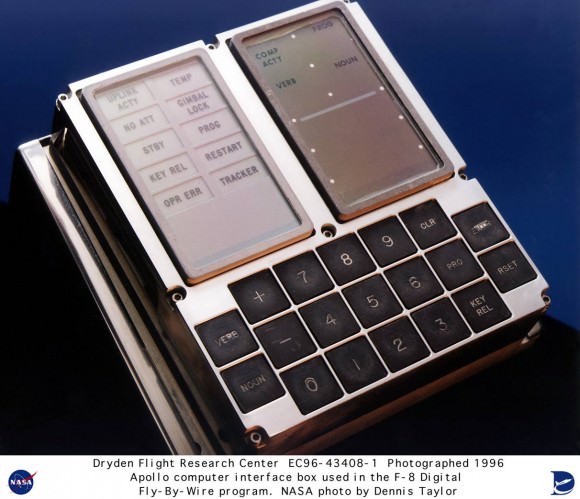[/caption]
Springer/Praxis has produced a small library’s worth of books about the Apollo Program. A recent offering from the publisher focuses in on the Apollo Guidance Computer. This topic, for the uninitiated, can be more than a little intimidating and if it is handled wrong veer off the path of a book about space flight and toward a pure “tech” book. This is not a problem that Springer/Praxis’ offering The Apollo Guidance Computer has, the book is well rounded, in-depth and easy-to-read.
Written by Frank O’Brien, The Apollo Guidance Computer is a thorough review of the computer system used during the Apollo missions. The Apollo Guidance Computer rings in at a whopping 430 pages – most readers will likely only pick out certain parts of the book to read. The book is, in a number of ways, many separate books in one – with details of the guidance computer, its development, the requirements to send astronauts to and from the Moon as well as the challenges that the engineers face in developing this revolutionary piece of equipment – all detailed within.
The book starts out by turning the clock back about 50 years to allow the reader to see what technology was like half a century ago. During this time period computers generally filled an entire room. This (obviously) was not possible in the case of Apollo’s guidance computer – and The Apollo Guidance Computer works to detail that story.
As far as O’Brien is concerned, he sees the book as something that techies, looking to learn how this computer system was developed, and space buffs who are seeking to learn the various intricacies of traveling to the Moon – can both enjoy.

“It’s a bit different from other books that are found in spaceflight libraries, in that it is appealing to two very different groups,” said O’Brien during a recent interview. “Sometimes I joke that those interested in computers read it from the beginning till the end – whereas space enthusiasts –read it from the end to the beginning.”
For his part O’Brien acknowledges that not all parts of the book will interest all people. He is fine with that as long as readers enjoy the elements of the book that relate to them. He does hope that all readers pick up on how designers managed to pack away so much capability into a very limited structure. There was no disk, tape, or secondary storage – of any kind.
The book works to provide a link to demonstrate how the Apollo guidance computer allowed for one of the greatest accomplishments in human history. It details how difficult the actual lunar landing was and how the computer system was instrumental in accomplishing this feat.
Whereas many of Springer/Praxis’ offerings detail flight aspects of the Apollo era, this text takes a look at one of the essential elements that made those missions possible. While other books provide understanding of the Apollo Program in the broadest of strokes – this book allows readers to see the moon shot’s finest details. It also provides context into the era in which this machine was developed. Only in the 60s could an entry code be entitled BURNBABY (as in “Burn Baby Burn!”).


